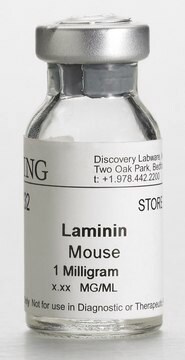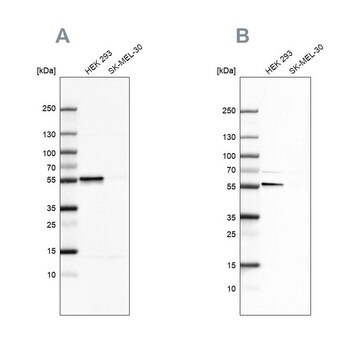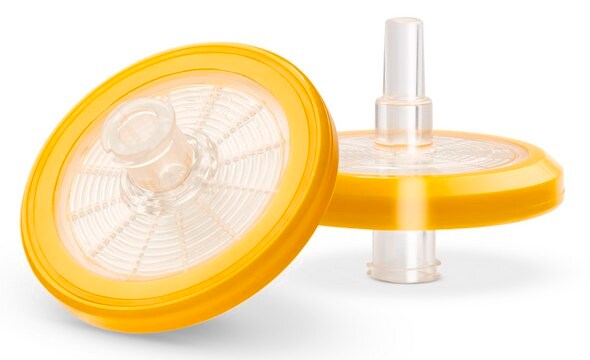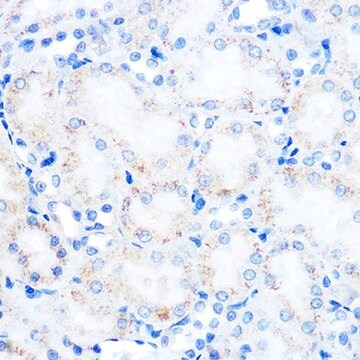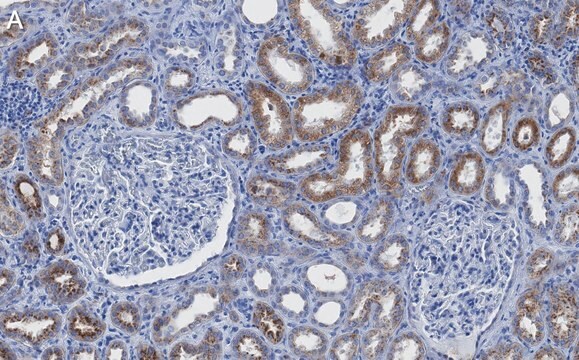ZMS1221
Anti-LAMP2 Antibody, clone H4B4 ZooMAb® Mouse Monoclonal

recombinant, expressed in HEK 293 cells
Sinónimos:
CD107 antigen-like family member B, CD107b, LAMP-2, LGP-96, Lysosome-associated membrane glycoprotein 2, Lysosome-associated membrane protein 2
About This Item
Productos recomendados
origen biológico
mouse
Nivel de calidad
recombinante
expressed in HEK 293 cells
conjugado
unconjugated
forma del anticuerpo
purified antibody
tipo de anticuerpo
primary antibodies
clon
H4B4, recombinant monoclonal
descripción
recombinant, expressed in HEK 293 cells
Línea del producto
ZooMAb® learn more
formulario
lyophilized
mol peso
calculated mol wt 44.9 kDa
observed mol wt ~105 kDa
purificado por
using protein G
reactividad de especies
human
envase
antibody small pack of 25
características de los productos alternativos más sostenibles
Waste Prevention
Designing Safer Chemicals
Design for Energy Efficiency
Learn more about the Principles of Green Chemistry.
validación mejorada
recombinant expression
Learn more about Antibody Enhanced Validation
sustainability
Greener Alternative Product
técnicas
flow cytometry: suitable
immunohistochemistry: suitable
western blot: suitable
isotipo
IgG1κ
secuencia del epítopo
Unknown
Nº de acceso Protein ID
Nº de acceso UniProt
categoría alternativa más sostenible
Condiciones de envío
ambient
temp. de almacenamiento
2-8°C
Información sobre el gen
human ... LAMP2(3920)
Descripción general
Especificidad
Inmunógeno
Aplicación
Evaluated by Western Blotting in HeLa cell lysate.
Western Blotting Analysis: A 1:10,000 dilution of this antibody detected LAMP2 in HeLa cell lysate.
Tested Applications
Western Blotting Analysis: A 1:10,000 dilution from a representative lot detected LAMP2 in lysate from U937 cells and 1:1,000 dilution in lysate from Jurkat cells.
Immunohistochemistry (Paraffin) Analysis: A 1:1,000 dilution from a representative lot detected LAMP2 in Human liver tissue sections.
Flow Cytometry Analysis: 0.1 µg from a representative lot detected LAMP2 in one million U937 cells.
Note: Actual optimal working dilutions must be determined by end user as specimens, and experimental conditions may vary with the end user.
Descripción de destino
Forma física
Reconstitución
Almacenamiento y estabilidad
Información legal
Cláusula de descargo de responsabilidad
¿No encuentra el producto adecuado?
Pruebe nuestro Herramienta de selección de productos.
Código de clase de almacenamiento
11 - Combustible Solids
Clase de riesgo para el agua (WGK)
WGK 1
Punto de inflamabilidad (°F)
Not applicable
Punto de inflamabilidad (°C)
Not applicable
Certificados de análisis (COA)
Busque Certificados de análisis (COA) introduciendo el número de lote del producto. Los números de lote se encuentran en la etiqueta del producto después de las palabras «Lot» o «Batch»
¿Ya tiene este producto?
Encuentre la documentación para los productos que ha comprado recientemente en la Biblioteca de documentos.
Nuestro equipo de científicos tiene experiencia en todas las áreas de investigación: Ciencias de la vida, Ciencia de los materiales, Síntesis química, Cromatografía, Analítica y muchas otras.
Póngase en contacto con el Servicio técnico


